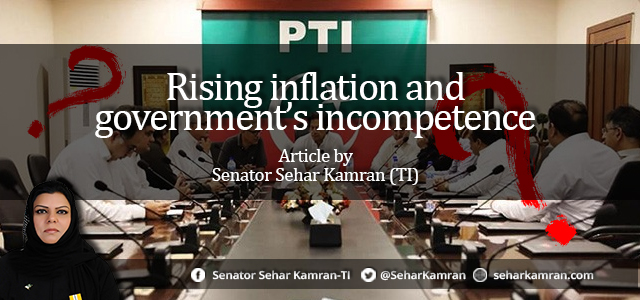By Senator Sehar Kamran (TI)
Feb 24, 2020
 Pakistan is facing a myriad of challenges. Some of them are unavoidable while others are self-created. The recent increase in the price of everyday commodities, especially food items, has affected all segments of society. Lack of an economic vision along with policy dictation from the International Monetary Fund (IMF), poor governance, administrative inexperience, and official incompetence are some of the factors that have led to the spiraling cost of living in the country.
Pakistan is facing a myriad of challenges. Some of them are unavoidable while others are self-created. The recent increase in the price of everyday commodities, especially food items, has affected all segments of society. Lack of an economic vision along with policy dictation from the International Monetary Fund (IMF), poor governance, administrative inexperience, and official incompetence are some of the factors that have led to the spiraling cost of living in the country.
According to the data released by the Pakistan Bureau of Statistics, inflation jumped from 12.6 percent in December to 14.6 percent in January, scaling the highest level in the last 12 years. The PBS figures also suggest that inflation has hit the rural areas more than the urban ones because the majority of the country’s population resides in small towns and villages.
Economic experts have attributed the rising inflation to the IMF bailout package that was approved last year. It is no secret that the Fund has indirectly dictated Pakistan’s economic and fiscal policies for nearly a year now. The current government has been unable to strike a balance between IMF demands and the economic necessities of vulnerable social segments. Instead of mitigating the impact of food inflation on the marginalized, officials are taking cosmetic measures such as launching crackdowns against alleged hoarders. Over the years however, we have seen that such measures do not yield substantial results but only trigger panic and instability on the ground. In addition, the constant hikes in electricity and gas prices have not only directly contributed to the increase in inflation but has hit the common man the most in economic terms.
Incompetence accompanied by hubris is a recipe for disaster. The present government needs to realize that it cannot continue with its knee-jerk responses and myopic economic policies anymore
Sehar Kamran
According to the IMF, GDP growth is projected at 2.4 percent in the current fiscal year which constitutes a sharp decline from 5.8 percent in 2018. Similarly, the Fund has noted that there will be a rise in inflation and unemployment in the coming months. It predicted that unemployment will be 6.2 percent higher than in 2018 and 2019 when it stood at 6.1 percent.
Ever since the Pakistan Tehreek-e-Insaf government assumed the country’s political power in August 2018, the economic condition has taken a turn for the worse. When the ruling party came into power, it promised to create 10 million jobs in five years. Instead of generating more employment opportunities, however, it has even threatened existing ones.
GDP growth has drastically decreased which has resulted in an economic slowdown and unemployment. Every sector of the economy is suffering due to the lack of proper policy and direction. Government officials claim that they have a plan, but their statements are not translating into anything substantial on the ground. The instability and confusion in the economic realm is growing with each passing day.
It is feared that before the official 2020 budget, a mini-budget will be unveiled owing to the Federal Board of Revenue’s tax collection shortfall of Rs. 387 billion in the first seven months of this fiscal year. Experts say the shortfall may reach Rs. 700 billion by June this year if there is no [mini] budget. To make matters worse, the position of FBR chairman is currently vacant. The indecision of the PTI government is hurting ordinary citizens. Some economists have predicted the worsening situation might push at least 1.8 million people into poverty during the present fiscal year.
Incompetence accompanied by hubris is a recipe for disaster. The present government needs to realize that it cannot continue with its knee-jerk responses and myopic policies anymore. The country’s economy is struggling, and things are only getting worse. The monetary terms being dictated by the IMF at the cost of the livelihood of ordinary Pakistanis are unacceptable because the poor cannot keep up with rising inflation. It is impacting their quality of life and will inevitably generate a massive socioeconomic backlash in the longer run.
The incumbent government cannot continue blaming previous administrations for its own inaction and lack of economic foresight. Unfortunately, the hesitation and delay in taking important decisions have already cost the country much. People are rightly getting impatient since the current situation is no longer sustainable.
*Sehar Kamran is teh President of the Centre for Pakistan and Gulf Studies (CPGS), she is a prominent politician, acadmeician and practitioner in the areas of regional, international defense and strategic studies. Twitter @SeharKamran
Same version of the article appeared in The Arab News


